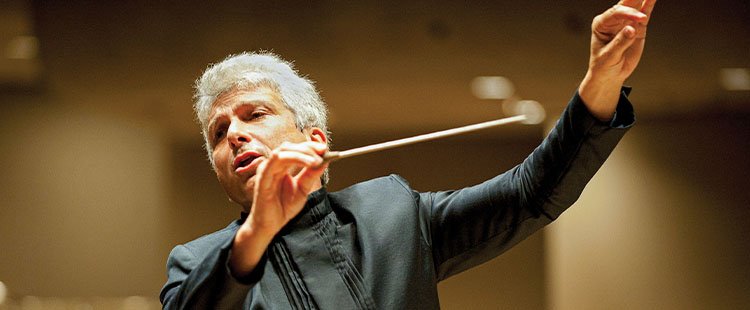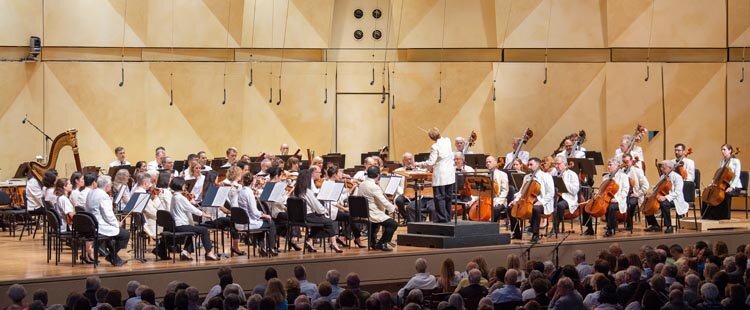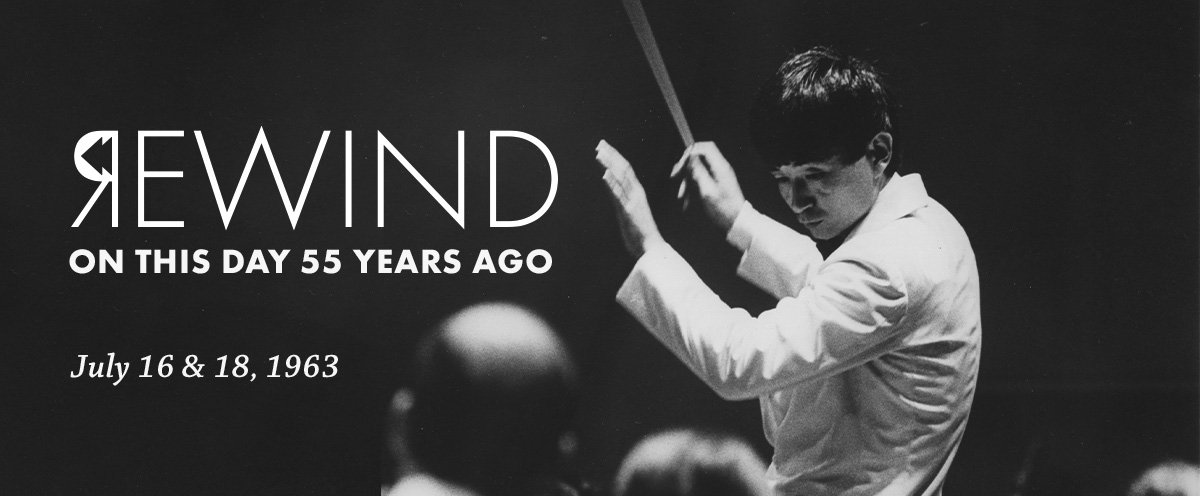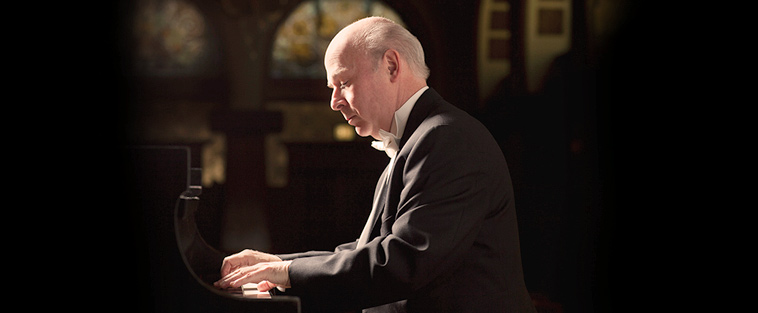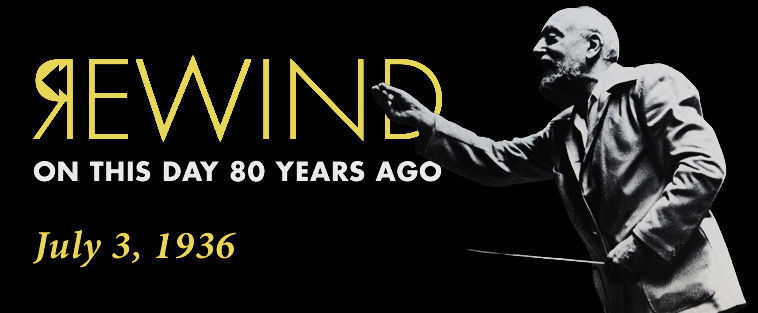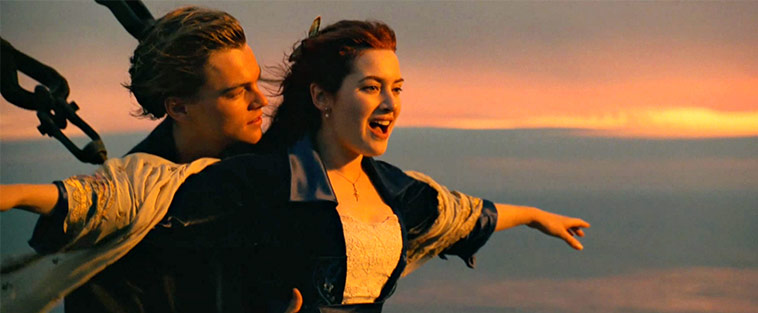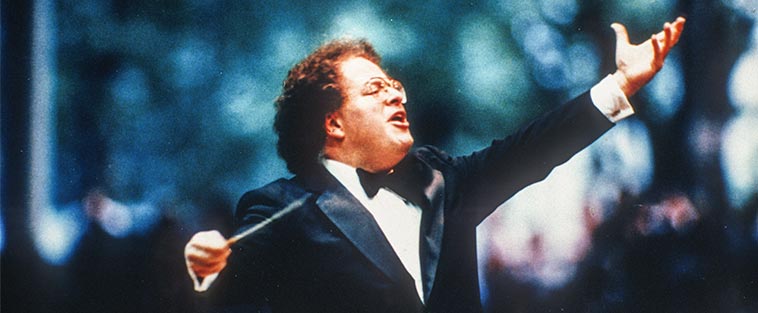Now there’s a new work of genius to elevate into this class: The Moons Symphony, composed by Amanda Lee Falkenberg. Yes, that’s Moons, plural. We earthlings have just one that typically captures our attention; unsurprisingly, that’s what initially fascinated Falkenberg. La Luna proved to be her “gateway drug” into a dazzlingly ambitious project mingling astronomy with music.
Read MoreChicago Symphony Orchestra
Pair de Lune
Classical music may have a centuries-old history, but among today’s top conductors, Marin Alsop is exceptionally open to trying new approaches. In both her choice of soloists and the programs she designed for her three weeks of Chicago Symphony Orchestra concerts July 12-26, Ravinia’s Chief Conductor is showcasing fresh faces and interesting ideas.
Read MoreBow to Baton: With blessings of major mentors, Peter Oundjian conducted an impressing career change
Violin soloists sometimes add conducting to their activities, dividing their time between the two roles or combining them at times. Famous examples include Pinchas Zukerman, who has served as music director of the English and Saint Paul Chamber Orchestras, and Joshua Bell, who holds the same post with London’s Academy of St. Martin in the Fields.
What ties those instrumentalist-turned-conductors together is that they made the move by choice. But when Peter Oundjian made the switch in 1995, the violinist had none. He was diagnosed with focal dystonia, a neurological disorder that causes involuntary muscle contractions—in his case, in the all-important left hand. It became impossible for him to continue as first violinist of the Tokyo String Quartet, one of the premier such ensembles in the world at the time.
But he has gone on to have a second career as impressive as his first, including serving as music director of the Toronto Symphony Orchestra from 2004 through 2018 and heading the Royal Scottish National Orchestra for six years. In 2019, he took over as music director of the Colorado Music Festival and has quickly built its profile. Indeed, Oundjian has enjoyed such success on the podium that many younger classical fans probably aren’t even aware of his earlier incarnation as a major chamber musician.
Read MoreWFMT to Broadcast Chicago Symphony Orchestra Opening Night Live
Ravinia is partnering with Chicago’s classical radio station WFMT to present a special live broadcast of the opening concert of the Chicago Symphony Orchestra’s residency at the festival on July 9 – a program led by Ravinia Chief Conductor and Curator Marin Alsop and featuring pianist Jorge Federico Osorio. This performance will mark the first major post-pandemic classical music event in the Chicago area presented before a large audience.
Read MoreRUMBLINGS OF A NEW WEST SIDE STORY
More than a century after his birth, Leonard Bernstein remains a pop culture phenomenon. Hot off the success of A Star Is Born, Bradley Cooper will direct and star in a biopic about multi-hyphenate who many consider the most important musician in American history. At the same time, America’s most successful filmmaker is remaking the treasured 1962 Best Picture Oscar winner West Side Story. Someone with Spielberg’s track record of blockbusters is in a position to pick only the best.
Read MoreRewind: July 16 and 18, 1963
If anyone had a knack for defying convention with an astounding rate of success, it was Leonard Bernstein. When he became music director of the New York Philharmonic in 1958—15 years after his surprise debut with the same ensemble, then only months into his tenure as its assistant conductor—the tradition had been for those assistants to remain in the position for only one year. But then Seiji Ozawa caught his eye. The winner of the 1960 Koussevitsky Prize at Tanglewood, where Bernstein had been a close advisor for the conducting and orchestral programs since 1951, and subsequently the winner of a scholarship to study with the quintessential maestro Herbert von Karajan, Ozawa was quickly sought by Bernstein to become one of the NY Phil assistants in 1961. One of three conductors in the role, Ozawa was nonetheless a clear favorite, being chosen to lead a performance during the orchestra’s 1961 tour and retaining a close association with Bernstein, if unofficially, through the maestro’s 1965 sabbatical.
The program insert for Seiji Ozawa’s hastily arranged Ravinia and Chicago Symphony Orchestra debut
The especial attention from “America’s music teacher” of course drew the attention of other ensembles. Ozawa made debuts with the orchestras of San Francisco, Minneapolis, Detroit, and Montreal between 1962 and 1963. During the latter summer, he received a call similar to that which Bernstein received in 1943: the conductor for the Chicago Symphony Orchestra’s concerts at Ravinia has suddenly taken ill at the 11th hour, and could Ozawa come conduct his concerts. Even with a program inherited from Georges Prêtre, comprising Beethoven’s Third Leonore Overture, Grieg’s Piano Concerto, and Dvořák’s “New World” Symphony, Ozawa appointed himself well in his Ravinia and CSO debuts on July 16, with the Chicago Daily News readily recognizing the influence of “Leaping Lenny”: “While conducting, he [Ozawa] slides easily from waltz to rhumba to twist to a modified version of the Limbo … however, he remains in control of the situation. Ozawa can make an orchestra do almost anything he wants … it would be hard to name a conductor of his age more gifted, and it will be fascinating to see what becomes of him.”
Ozawa leads a rehearsal with the Chicago Symphony Orchestra during his first season as Ravinia’s Music Director, 1964
The second night, July 18, was opened up to Ozawa, which caused the Daily News to assert, “It is necessary to revise the glowing estimation that appeared in this space … because by evening’s end it was becoming hard to think of many more gifted conductors of any age. This time, Ozawa faced and passed the only worthwhile test of a conductor: he brought a new work [Takemitsu’s Requiem for Strings], rehearsed the orchestra in it thoroughly, and then secured a performance of polish and poetic imagination. Very little time should elapse before he shows up again at the head of the Chicago Symphony.” In very little time indeed—just a few days more than a month later—Ozawa was named the first music director of Ravinia, where he would bring the flair and passion for the music of his time (as well as music written specifically for his time) that he shared so similarly with his mentor, Bernstein, through the end of the decade. ■
Nadine Sierra en Vogue

Soprano Nadine Sierra (a 2012 RSMI alum) was featured in the May edition of Vogue alongside other young divas of the Metropolitan Opera. “Her voice is soaring out into the black cave of the theater, filling every inch of it with beauty and heartache, when James Levine, the legendary conductor, stops the orchestra […] and asks his soprano to do it again.
Rewind: July 25, 1936
July 25, 1936: George Gershwin's Sole Ravinia Performance
After the Chicago Symphony Orchestra took residence at Ravinia on July 3, 1936, perhaps the next great highlight of that summer came just a few weeks later. Thousands descended upon the freshly reinaugurated festival in hopes of seeing—but most certainly for the chance to hear—the inimitable pianist, composer, and songwriter George Gershwin.
On the Fly: Jorge Federico Osorio Made Highland Park the Home of His International Career
Jorge Federico Osorio is a classical artist with an international career. Born in Mexico, he could make his home anywhere. Yet after living in New York City for seven years, followed by London for another 11, he chose Highland Park, IL, to be the place where he and his wife, Sylvana, put down their roots and raised their two sons, Dario and Santiago.
Fiddling Around: Wynton Marsalis Trumpets Human Connections in His Violin Concerto for Nicola Benedetti
Legendary trumpeter and composer Wynton Marsalis has worn many musical hats across his remarkable career. Thus, the idea that Ravinia would co-commission a concerto from a guy who studied at Juilliard and performed Haydn’s Trumpet Concerto with his hometown New Orleans Philharmonic when he was a mere 14 years old is not so strange.
Rewind: July 3, 1936
July 3, 1936: The CSO Residency Kicks Off
In 1936 Ravinia and the Chicago Symphony Orchestra began an enthusiastic partnership in presenting history’s greatest music in a uniquely lush and comfortable setting, and 80 years later that dedication is as strong as ever, forming the cornerstone of the festival’s classical mission, which also encompasses chamber music, recitals, kids concerts, Reach*Teach*Play, and Ravinia’s Stean’s Music Institute. Even before the relationship became official the CSO was a regular guest, dating back to 1905 as the Theodore Thomas Orchestra. Over the 17 concerts that compose its residency at Ravinia this summer, the CSO will play works that are just as powerful today as they were during that first season—from Beethoven’s Seventh, Brahms’s Second and Fourth, and Dvořák’s “New World” Symphonies to such orchestral delights as Respighi’s Pines of Rome and Strauss’s Don Juan to the playful swirl of Gershwin’s Rhapsody in Blue.
Blindsided by "Titanic"
Sometimes the power of a film can sneak up on you and catch you by surprise. That was the experience I had when I saw James Cameron’s film Titanic—for the third time.
Ahead of His Time
By John Schauer
A long time ago, when I was working as a journalist in California, I came to Ravinia to do a feature interview with James Levine, who was Ravinia’s music director at that time, and in the course of the interview he said something that still haunts me today, as if somehow he sensed what would happen as a result of “social media”—which of course did not yet exist at that time.
Ramsey Lewis Joins A New "In" Crowd with His First Classical Concerto
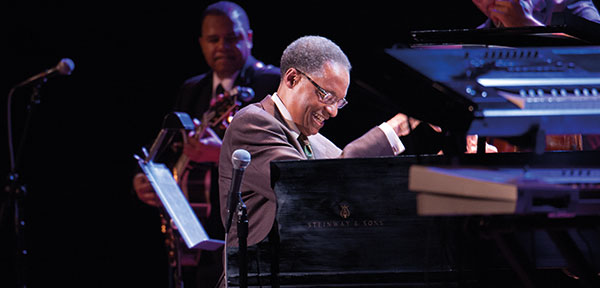
The traditions of jazz and classical music have enjoyed parallel histories but relatively few intersections. Yet players from Benny Goodman to Wynton Marsalis have famously commuted between the two realms, and composers from George Gershwin to Duke Ellington to Leonard Bernstein have negotiated areas of artistic agreement that have linked certain of their traditions in often exciting ways, creating the bedrock of symphonic jazz.
Taking The Flying Dutchman's Dare
I would like someday to give a lecture or write an article making a case for disliking classical music—at least some of it. I fear that people new to classical music may hear something they really detest and, not knowing the infinite variety of classical music, incorrectly conclude that they don’t like any classical music at all. But just about everyone, no matter how knowledgeable or devoted to music, must admit that there are portions of the repertoire they don’t enjoy.
In my case, there are numerous swaths of the classical repertoire that simply don’t appeal to me. Most pertinent at present, I don’t like Wagner.
A Symphony of Silk
So on ghastly summer days with 99-degree heat and 99 percent humidity, that's where I went in my imagination. Lying on my bed, I would put Scheherazade on the phonograph while nibbling grapes and sipping lemonade, as if I were the Persian ruler to whom the stories were being told. It didn't dispel the heat, of course, but somehow, in that setting, the climate seemed more natural and bearable--at least for as long as the music lasted.
Ravinia Engages Pianist Kevin Murphy as Director of the Vocal Program at the Steans Music Institute
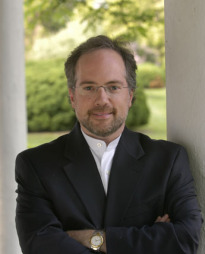 Ravinia Festival has named renowned pianist, music administrator and educator Kevin Murphy director of the festival’s summer music conservatory, the Steans Music Institute. He replaces Brian Zeger, who steps down in August after six years in the position. Murphy’s duties will include selecting 15 singers and five pianists from a worldwide pool of applicants to participate in the program each summer as well as securing faculty who will work with these artists over an intensive three-week residency. In consultation with the faculty, he will program four concerts of art song and three master classes each summer.
Ravinia Festival has named renowned pianist, music administrator and educator Kevin Murphy director of the festival’s summer music conservatory, the Steans Music Institute. He replaces Brian Zeger, who steps down in August after six years in the position. Murphy’s duties will include selecting 15 singers and five pianists from a worldwide pool of applicants to participate in the program each summer as well as securing faculty who will work with these artists over an intensive three-week residency. In consultation with the faculty, he will program four concerts of art song and three master classes each summer.
Murphy has been director of music administration at New York City Opera since September of 2008. Before that time, he was director of musical studies at the National Opera of Paris. In 1992 he was the first pianist invited by Maestro James Levine (former Ravinia music director) to participate in the Metropolitan Opera’s Lindemann Young Artist Development Program and continued as an assistant conductor from 1993 through June 2006. In addition to his on- and off-stage partnership with his wife, soprano Heidi Grant Murphy, he has collaborated in concert and recital with many of today’s leading artists, including Steans Music Institute alumna Michelle DeYoung, Nathan Gunn, Bryn Terfel, Plácido Domingo, Renée Fleming and others. Additional credits include performances of Mozart operas with the Chicago Symphony Orchestra at Ravinia.
“I can think of no better fit for Ravinia and the Steans Music Institute than Kevin, a truly respected and talented pedagogue who will spark and inspire the young professional musicians who will study with him,” said Ravinia Festival Music Director James Conlon. “Kevin is a friend, and I look forward to having him as a festival colleague.”



